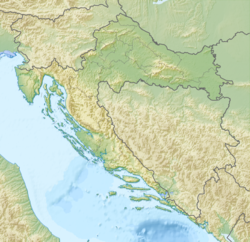Koprivnica Synagogue
| Koprivnica Synagogue | |
|---|---|
Croatian: Koprivnička sinagoga | |
 The former synagogue in 2021 | |
| Religion | |
| Affiliation | Reform Judaism (former) |
| Rite | Nusach Ashkenaz |
| Ecclesiastical or organisational status |
|
| Status |
|
| Location | |
| Location | Svilarska Street 10, Koprivnica |
| Country | Croatia |
Location of the former synagogue in Croatia | |
| Geographic coordinates | 46°09′51.4″N 16°49′55.3″E / 46.164278°N 16.832028°E |
| Architecture | |
| Architect(s) |
|
| Type | Synagogue architecture |
| Style | Moorish Revival |
| Date established | c. 1869 (as a congregation) |
| Completed | 1875 |
| Official name | Synagogue (Croatian: Sinagoga) |
| Type | Listed building |
| Reference no. | Z-3382 |
| [1][2] | |
The Koprivnica Synagogue (Croatian: Koprivnička sinagoga) is a former Reform Jewish synagogue, located in Koprivnica, Croatia. The congregation worshiped in the Ashkenazi rite. Completed in 1875 and used as a synagogue until World War II, the building has been used as the Krešimir Švarc Cultural Center, a cultural center, since 2013.
History[edit]
In 1869, around a hundred Jews lived in Koprivnica. Although relatively small, the Jewish community of Koprivnica funded the construction of the Koprivnica Synagogue. The synagogue was designed by the architectural firm Hönigsberg & Deutsch and built in 1875, along with a Jewish school. The location of the synagogue, in the heart of Koprivnica, was a prestigious choice at the time. In 1937, the synagogue was thoroughly remodeled by architect Slavko Löwy.
During World War II, the synagogue was destroyed and used as a prison. The organ and some other items from the synagogue were saved and are now preserved at the Koprivnica Museum. The Jewish community of Koprivnica was devastated during the war, with most of its members perishing in the Holocaust. The last rabbi of Koprivnica's Jewish community was Izrael Kohn who was taken to the Gospić concentration camp in the night between July 23 and July 24, 1941 and eventually died in Jasenovac.[3]
The Koprivnica Synagogue is one of the few synagogues in Croatia to survive the war. After the war, under the communist regime of SFR Yugoslavia, the synagogue was used as a tailoring factory and warehouse. Presently,[when?] a small Jewish community exists in Koprivnica.
In 2011, restoration of the Koprivnica Synagogue began and it was listed as a cultural monument.[4][5][6] Further restoration of the building was announced in late 2023.[7]
See also[edit]
References[edit]
- ^ "Synagogue in Koprivnica". Center for Jewish Art: Historic synagogues of Europe. Foundation for Jewish Heritage and the Hebrew University of Jerusalem. 2023. Retrieved May 19, 2024.
- ^ "Sinagoga". Pretraživanje Registra kulturnih dobara Republike Hrvatske (in Croatian). Ministarstvo kulture i medija Republike Hrvatske. Retrieved May 19, 2024.
- ^ "Sličica iz seoskog života poljskih Židova" (in Croatian). Vršac: Savez rabina Kraljevine S. H. S.
- ^ "Židovska općina Koprivnica" (in Croatian). CENDO - Istraživački i dokumentacijski centar. Retrieved July 11, 2013.
- ^ Petrić, Hrvoje (November 19, 2012). "Crtice iz povijesti - doseljavanje Židova" (in Croatian). Koprivnica.net. Retrieved July 11, 2013.
- ^ "Radovi na Sinagogi u Koprivnici" (in Croatian). Varaždinska Televizija. July 25, 2011. Archived from the original on December 24, 2014. Retrieved July 11, 2013.
- ^ "Croatia Update: Restoration of former synagogue in Koprivnica will be completed thanks to new €2 million grant". Jewish Heritage Europe. December 31, 2023. Retrieved May 19, 2024.
External links[edit]
 Media related to Synagogue in Koprivnica at Wikimedia Commons
Media related to Synagogue in Koprivnica at Wikimedia Commons
- 1860s establishments in Croatia
- 19th-century synagogues in Europe
- Ashkenazi Jewish culture in Croatia
- Ashkenazi synagogues
- Buildings and structures in Koprivnica-Križevci County
- Former synagogues in Croatia
- Jewish organizations established in the 1860s
- Koprivnica
- Moorish Revival architecture in Croatia
- Moorish Revival synagogues
- Register of Cultural Goods of the Republic of Croatia
- Synagogues completed in 1875

